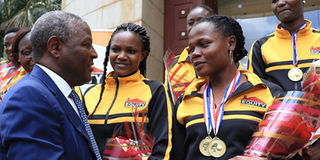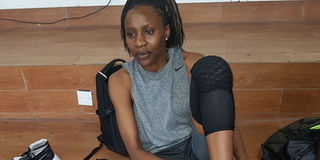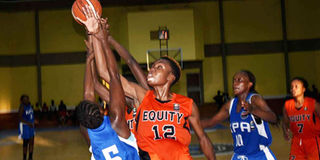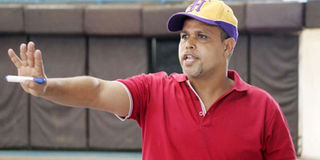Equity, KPA rule the region but run out of gas on African terrain in bad year for men
What you need to know:
- Coaches call for total overhaul of the local game to enable Kenyan teams compete well in the continent.
- For the third year running, bankers and dockers fail to replicate their fine form in Zone Five games at the Africa Club Championships.
Kenyan women again dominated the 2018 Fiba Africa Zone Five Championships held in Dar es Salaam, taking the first two positions for the third straight year but the teams flopped at Africa Club Championships and failed to break into the top four, pointing to the poor standards of the game locally.
Just like in 2016 and last year, Equity Bank from Kenya won the Zone Five Championships, with another Kenyan team Kenya Ports Authority (KPA) finishing second, but the teams could not replicate that performance at the continental championships.

Equity Bank CEO James Mwangi (left) greets Hawks' Seline Okumu (right) upon the team's arrival at Equity Centre, Nairobi after landing from Dar es Salaam, Tanzania where the team clinched the Fiba Zone Five Basketball Championship title on October 8, 2018. Okumu as well as Hilda Indasi have re-joined KPA. PHOTO | PHILIP ONYANGO |
The best performance by a Kenyan team at the Africa Club Championships is a fifth place finish by Kenya Ports Authority women in Angola last year. Equity Bank, who competed alongside KPA in Angola last year, finished eighth at the time.
This year however, KPA dropped to seventh place in the championship held in Maputo while Equity finished ninth.

-United States of America-based star forward Taudencia Katumbi prepares for training at the Kenya Port Authority's Makande Hall on November 9, 2018. She arrived in the country early Friday morning to join KPA women's basketball team camp ahead of the 2018 Africa Cup Championships to be held in Maputo, Mozambique next week. PHOTO | PHILIP ONYANGO |

Kenya Ports Authority (KPA) women basketball team players await clearance at the Maputo International Airport on November 13, 2018. KPA were detained at the airport for close to four hours due to a visa-fee hitch. PHOTO | PHILIP ONYANGO | NATION MEDIA GROUP
There were also positives in 2018, with the national classic basketball league concluding in time for the first time in three years. There were also several youth activities, notably the junior NBA basketball programme which saw many young players compete at a higher level under the watchful eyes of top American coaches.

Hellen Oketch #5 of KPA women's basketball team challenges Equity Bank's Belinda Okoth #12 during their National Classic Basketball League women's play-offs final at KPA's Makande Hall in Mombasa on December 13, 2018. PHOTO | KEVIN ODIT |
However, the standard of Kenyan basketball is far from convincing, especially the men’s game. This was clear for all to see when local men’s teams continued to play second fiddle to Uganda and Rwandan opponents both at club and national team level.
FINISHED FOURTH
In men’s Fiba Zone Five Club Championships in Dar es Salaam in September for example, KPA finished fourth behind Al Ahly and Smouha of Egypt who finished first and second respectively, while Rwanda Energy Group (REG) were third. The other Kenyan team - Strathmore Blades - finished a distant eighth.
It was a similar story in last year’s championships in Kampala where KPA men, the only Kenyan team competing at the championships, finished third behind winners Oilers from Uganda and second-placed Patriots of Rwanda.
A visit to Nairobi by Cameroonian and Ugandan men’s national teams in November for a series of friendly matches only served to expose the gulf in class between the Kenyan teams and the visitors as both teams beat the home team by convincing margins, never mind that Kenya fielded a handful of foreign-based players.

KPA's Victor Bosire (right) dribbles past Strathmore Blades' Ken Owalo during their Kenya Basketball Federation men's Premier League play-off semi-final match on November 18, 2018 at Nyayo Stadium Gymnasium. PHOTO | CHRIS OMOLLO |
Kenya’s head coach Ronnie Owino however believes all is not lost, pointing out that national teams which were once a power house in the region have a good chance of bouncing back following Kenya Basketball Federation’s decision to have a national team which will train weekly throughout the year.
“There is nothing special Rwanda and Uganda have been doing to beat us. They are simply spot-on with their preparations while we have been waiting for the last minute to assemble and field an ill-prepared team,” Owino, who is also a Fiba coaches’ instructor, said.
Fingers have pointed at local basketball referees over the poor state of the game, with many coaches accusing the officials of either being incompetent or biased. According to KPA coach Anthony Ojukwu, the local referees have been inconsistent in officiating matches, something he says has affected Kenyan teams in international championships.
“Our referees are just poor. The way they handle matches confuses the players even more because they are not consistent with their calls, making it very difficult for us coaches to teach the players that what we think is correct,” Ojukwu said.

KPA women's basketball team coach Anthony Ojukwu giving tips to his players in training on September 26, 2018 at the Makande Hall, Mombasa. PHOTO | PHILIP ONYANGO |
Owino agrees with this view, saying there is a big shortage of basketball referees locally, putting the few available under pressure.
“Impartiality is the key word here because the shortage of whistlers locally has seen some club officials officiate matches involving their own teams, making them biased,” he said.
Owino now wants all the 62 teams in the KBF leagues to be compelled to have accompanying referees to increase the number available locally to help alleviate the problem.
Stakeholders are of the view that KBF must employ a raft of measures to revive the Kenyan game. United States International University of Africa’s head of sport, Bonny Salano, is of the view that KBF should throw out universities and colleges from the National Classic basketball league, and reduce the number of teams in the league to eight.
According to Salano, Kenyan clubs are used to walloping college teams in the local league as the teams field inexperienced players from secondary schools, giving the clubs a false impression that they are competent, only to perform poorly at the continental championships in the face of stronger opponents.
"We should reduce the number of teams in the league to eight which, in my opinion, will ensure they register only quality players. Colleges should play in their own leagues and act as a feeder to these clubs whenever the students are through with college education,” Salano said.
YOUTH TEAMS
The gulf in class between teams from other countries and Kenyan teams, especially KPA women who have played at the continental championship for more than 15 years, can also be solved by ensuring all league teams have youth teams competing at a lower level. This will ensure consistent supply of talented youngsters for the senior teams.
Kenyan teams should also adopt a professional approach to the game by putting in place clear leadership and development structures.
Local teams should also have a common coaching syllabus for all teams across the country. This will enable the youth acquire basic skills uniformly from a tender age.
According to Angola’s celebrated basketball player Victor Muzadi, the country’s teams have the same development structures right from the club level to the national teams.
Muzadi, who is the head of 3-on-3 basketball in Angola, says the country’s coaches follow the same training structures, making it easy for the players to quickly adapt whenever called upon for international assignments.
“In Angola, it’s the same style everywhere. Whether teams are learning motion offense, press defence, three-point shooting both for the guards and the posts, everybody runs the same system. This has helped our players grow at the same level,” he said in a past interview. The opposite is the case in Kenya as every coach runs his or her own system.

KPA coach Sammy Kiki gives instructions from touchline in a Kenya Basketball Federation (KBF) Premier League match against Equity Bank played on October 17, 2015 at the Nyayo National Stadium. PHOTO | CHRIS OMOLLO |





